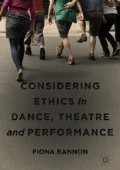Abstract
The discussion introduces a range of challenges that we face in terms of learning to live affective and examined lives. As the chapter develops, we consider how our complex interrelations play a significant role in how we learn to think and correspond with one another and with our context. The chapter seeks to establish the advantages to be found through engagement in cooperative and developmental projects, where realising ideas together—rather than seeking to individually own them—supports our progress towards a unifying wholeness. The debate embraces a range of contemporary thinkers who, like Spinoza, appreciate that in and through behaviour that is ethical, we can come to acknowledge the benefits to be gained in our interconnected futures.
Access this chapter
Tax calculation will be finalised at checkout
Purchases are for personal use only
Bibliography
Agamben, G. (1993). The coming community. Minneapolis: University of Minnesota Press.
Ahmed, S. (2000). Strange encounters: Embodied others in post-coloniality. New York: Taylor & Francis.
Badiou, A. (2012). Ethics. London: Verso.
Bennett, J. (2001). The enchantment of modern life. Princeton, NJ [u.a.]: Princeton University Press.
Bohm, D. (2004). On dialoque. London: Routledge.
Braidotti, R. (2006). Transpositions: On nomadic ethics. Cambridge: Polity Press.
Damasio, A. (2003). Looking for Spinoza: Joy, sorrow, and the feeling brain. Orlando, FL: Harcourt Brace International.
Deleuze, G. (1990). Expressionism in philosophy (trans. Martin Joughin). Massachusetts: Zone Books.
Deleuze, G. (1994). Difference and repetition (trans. Paul Patton). London: Athlone Press.
Deleuze, G. (1988). Spinoza: Practical philosophy. San Francisco: City Lights Books.
Deleuze, G. and Guattari, F. (1994). What is philosophy? (trans. Hugh Tomlinson & Graham Burchill). London: Verso.
Deleuze, G. and Guattari, F. (2008). A thousand plateaus. London: Bloomsbury.
Deleuze, G. and Guattari, F. (2014). A thousand plateaus. London: Bloomsbury Academic.
Deleuze, G. and Parnet, C. (1987). Dialogues. New York, NY: Columbia University Press.
Eagleton, T. (2003). After theory. London: Penquin.
Ellis, C. (2007). Telling secrets, revealing lives: Relational ethics in research with intimate others. Qualitative Inquiry, 13(1), pp. 3–29.
Foucault, M. (1997). What is enlightenment?. In: P. Rabinow, ed., Ethics: Subjectivity and truth, 1st ed. New York: New Press, pp. 303–319.
Gadamer, H. (1975). Truth and method. New York: Seabury Press.
Gatens, M. (1995). Imaginary bodies: Ethics, power and corporeality. New York: Taylor & Francis.
Gielen, P. (2014). Situational ethics: An artistic ecology. In: P. Gielen and C. Guy, ed., The ethics of art ecological turns in the performing arts, 1st ed. Amsterdam: Valiz, pp. 17–40.
Iser, W. (2001). The range of interpretation. New York, NY, United States: Columbia University Press.
Lloyd, G. (1994). Part of nature: Self knowledge in Spinoza’s “ethics”. Ithaca, NY, United States: Cornell University Press.
Lloyd, G. (1996). Routledge philosophy guidebook to Spinoza and the ethics. London: Routledge.
Lloyd, G. (2013). Enlightenment shadows. Oxford: Oxford University Press.
Madan, G. (1985). Notebooks. Oxford: Oxford University Press.
Massumi, B. (2003). Navigating movements. [online] Available at: http://www.brianmassumi.com/interview/navigatingmovements.pdf [Accessed 8 Aug. 2016].
May, T. (1995). The moral theory of post structuralism. Pennsylvania: Pennsylvania State University Press.
Murdoch, I. (1970). The sovereignty of the good. 1st ed. London: Kegan Paul.
Nancy, J. (1993). The birth of presence. California: Stanford University Press.
Nussbaum, M. (2007). Frontiers of justice: Disability, nationality, species membership. Cambridge, MA: Harvard University Press.
Sayer, A. (2011). Why things matter to people: Social science, values and ethical life. Cambridge: Cambridge University Press.
Sennett, R. (2013). Together: The rituals, pleasures and politics of co-operation. London: Penguin Press/Classics.
Spinoza, B. and Elwes, R. (1951). Benedict de Spinoza: A theologico-political treatise and a political treatise. New York: Dover.
Todd, S. (2003). Learning from the other: Levinas, psychoanalysis, and ethical possibilities in education. Albany: State University of New York Press.
Yeats, W. (1912). The cutting of an agate. Kessinger Publishing, LLC (November 10, 2007).
Žižek, S. (2002). Welcome to the desert of the real! London: Verso.
Author information
Authors and Affiliations
Rights and permissions
Copyright information
© 2018 The Author(s)
About this chapter
Cite this chapter
Bannon, F. (2018). Embodying Ethics: Harmonics of Living. In: Considering Ethics in Dance, Theatre and Performance. Palgrave Macmillan, Cham. https://doi.org/10.1007/978-3-319-91731-3_2
Download citation
DOI: https://doi.org/10.1007/978-3-319-91731-3_2
Published:
Publisher Name: Palgrave Macmillan, Cham
Print ISBN: 978-3-319-91730-6
Online ISBN: 978-3-319-91731-3
eBook Packages: Literature, Cultural and Media StudiesLiterature, Cultural and Media Studies (R0)

